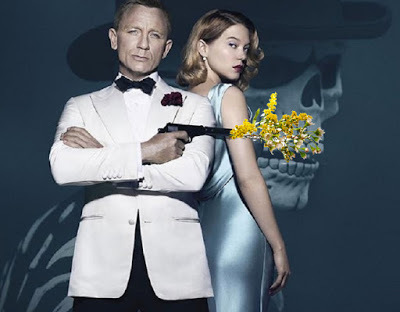An Arresting Development

True confession: Bond films are one of my guilty pleasures ever since boyhood chum Mike Blowen and I stumbled on From Russia with Love which was playing as the backend of a double feature with Fluffy, a Tony Randall romp about a crazy professor and his pet lion (those were better days for lions). So naturally we chose Spectre, the new one Bond, as our stepping out on Thanksgiving weekend movie.
Here’s what New York Times film critic Manohla Dargis wrote about Spectre in her review: “There’s nothing surprising in Spectre, the 24th ‘official’ title in the series, which is presumably as planned.”
Holy spoiler alert! “Nothing surprising”? I’ve seen every one of these official and unofficial Bond films multiple times and I’m here to tell you that the ending to this one is outright shocking. And for those worried I’m about to ruin the movie for them, I must say that Bond films are really quite impervious to spoiler alerts because they are as dedicated to formula as is a Grand Prix F1 race. You know where all the twists, turns, straightaways and danger signs are before you watch it. What’s more, with a Bond film, you not only know where the finish line is (the big, secret, doomsday industrial complex in a remote, impenetrable location) but you know who is going to cross it first…Bond…James Bond..with a bang and a woman.
There’s about 20 minutes more of playing time in Spectre after the requisite world-saving explosion, and then the film climaxes this way: Bond ignores his arch-villain’s pleadings to be killed; Bond tosses his gun into the Thames; and M appears over the prone body of the bad guy and places him under arrest.
Anyone who’s been watching American movies since Clint Eastwood and Charles Bronson came to embody “liberal Hollywood’s” belief that the courts could not be trusted to dispense justice…or, to put it another way, that the only answer to a bad guy with a gun is a good guy with a gun…knows that long before the odious Wayne LaPierre of the NRA made that the punchline of our time filmmakers have been romanticizing pistols over judicial process. All the big, flashy action film franchises, from Bond to Bourne to the Die Hards, Lethal Weapons and Robocops, end with the bad guys being killed rather than cuffed. The same is true of singular hits, like Training Day, Heat, End of Watch, The Departed….
There are exceptions of course--like the Hannibal Lechter films, where the villain conducts much of his mischief from behind bars; fact-based films, like The Untouchables, where an arrest is dictated by actual events; and smart films, like Fargo, which appeals to a more sophisticated audience that doesn’t need its bloodlust sated all the way to the closing credits. But generally speaking, arrests in good guys/bad guys movies are as rare as waiting for sex until the second date (which… another spoiler alert…also happens in Spectre). Building the climax of Spectre around an arrest doesn’t seem to be a capricious choice either. About two-thirds of the way through, a main character delivers some anti-gun dialog (which also should’ve been surprising to anyone paying attention). Though the dialog does nothing to lessen Bond’s body count on the way to the climactic scene, it does add critical context as to why he tosses his gun away.
I don’t want to make too very much of this and appear to be setting the producers of Spectre up for a Nobel Peace Prize, but at a time when we are desperately in need of any public stand against the nonstop gun violence, both in our public places and our public entertainment, even this slight nod toward sanity is welcome. How much of an impact a scene or two in a Bond film can have on the escalation of gun violence is uncertain. But surely if it’s worth paying out millions for a passing product placement in a Bond movie to sell watches or gin, it must be worth something for 007 in a passing moment to say “no” to guns. Perhaps this will be…excuse the expression…the first shot fired in Hollywood’s return to a sense of social responsibility it all but abandoned when it decided to lift the wallets of 18-24 males rather than lift their consciences.
Surely, it seems, as if the NRA would like to see more movies take a stand against guns. After all, why else would they automatically and persistently wag a finger at Hollywood violence whenever there’s another mass shooting? Of course, if the NRA’s tears after every shooting weren’t of the crocodile variety rather than casting blame elsewhere they would be inviting Hollywood and the mental health community to join them in trying to guide our society out of its bloody downward spiral.
First Amendment purists get uneasy when responsibility for the gun death epidemic…either by mass killers or killer cops…gets linked to any kind of creative expression…even the Michael Bay kind. But we can’t be connecting dots between a mass shooter mouthing off about “No more baby parts” and politicians mouthing off about same, while denying that an endless tsunami of violent films has no effect on young impressionable minds. This is not a call for government control of violent levels in films, but it is another call for moviemakers to start taking the gun crisis and its role in creating it seriously.
And how ironic if a character famously known for his license to kill is the one who leads the film industry there? Tell me that wouldn’t be a surprise.
Published on December 01, 2015 15:42
No comments have been added yet.



